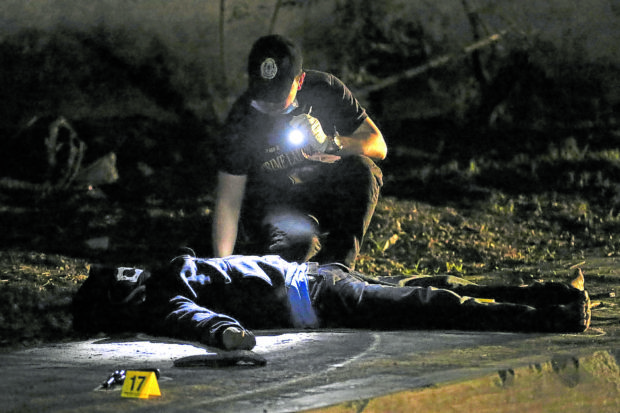4 years after Kian’s death, CHR asks gov’t anew to stop drug-related killings

WAR ON DRUGS A police investigator inspects the body of a suspected victim of extrajudicial killing. INQUIRER FILE PHOTO
MANILA, Philippines — With the 4th death anniversary of Kian delos Santos, the Commission on Human Rights (CHR) on Monday called on the government to stop the killings in President Rodrigo Duterte’s so-called war on drugs.
“Today, as we remember the 4th death anniversary of Kian, we echo our call: Itigil ang patayan [stop the killings],” said CHR spokesperson Jacqueline Ann de Guia in a statement.
“The work in pursuit of truth and justice is never complete until all perpetrators are held to account,” she added.
De Guia also called on the national government to uphold human rights by strengthening the investigations on the victims of police brutality including those in Duterte’s anti-drug campaign.
“We call on the government to give better meaning to commitments to uphold human rights by seeking the truth behind numerous deaths and other forms of human rights violations in the country, including cases of alleged extrajudicial killings linked to the government’s anti-drug campaign,” said de Guia in a statement.
Article continues after this advertisement“We must continue to assert the value of human life and dignity, and cease regarding others as mere collateral damages in pursuit of public peace,” she added.
Article continues after this advertisementAccording to De Guia, the CHR also remains open to working with the government in investigating cases of alleged human-rights violation, especially for the plight of the weak, vulnerable, and marginalized.
On August 16, 2017, Grade 11 student Delos Santo was killed in a police operation in Barangay 160, Caloocan City.
Police claimed that Delos Santos resisted arrest and opened fire at them, but closed-circuit television (CCTV) camera footage showed the policemen dragging the victim before being shot.
On November 29, 2018, police officers involved in the death of Kian were found guilty.
Meanwhile, the number of those killed in drug war operations stood at 6,165 from the time President Rodrigo Duterte took office until July 28, 2o21, according to official records of the Philippine Drug Enforcement Agency.
Other sources, however, have higher figures, such as the United Nations (UN) Office of the High Commissioner for Human Rights, which put the number of deaths at 8,663 as of March 2020.
Still other human rights organizations pegged the death toll at over 20,000.
The UN Human Rights Office has since urged the government to address the “widespread and systematic killing of thousands of alleged drug suspects” and the “persistent impunity and formidable barriers in accessing justice” in the country.
“Yet investigations of thousands of cases in question are still pending, with only few cases reaching the courts and other fora,” said De Guia.
RELATED STORY:
War on drugs: The violence, scars, doubts and families it left behind